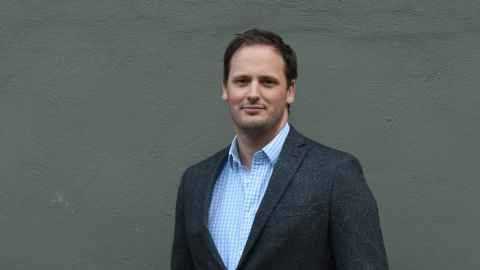Graeme Fielder
Corporate Development, Audentes Therapeutics.

Albert Einstein once said “the most beautiful thing we can experience is the mysterious. It is the source of all true art and science.”
Beginning his scientific journey at Manurewa High School, where Graeme Fielder says he became “hooked on science” it’s unlikely he would have fully grasped the significance of Einstein’s quote at such a young age. However, his own career would eventually be drawn into a mysterious world of science all of its own.
A natural when it came to science fairs and entering every one during his five years at high school, the opportunity to explore his growing interest in biotechnology was enticing.
“My parents never really had to worry much about me doing my homework. I developed this early fascinating with science and particularly biotech around the time the International Human Genome Sequencing Consortium published the first draft of the human genome project in 2001. I was soon hooked.”
Enrolling in a Bachelor of Technology (Biotechnology) and quickly finding his “tribe,” the chance to mix with other like-minded students who shared a passion for scientific discovery further fuelled Graeme’s motivation.
He went on complete his PhD in molecular medicine, an exercise Graeme describes as a “rewarding but emotional rollercoaster” due to the fact “99% of what is tried in the lab doesn’t work, so you’re really living for that 1%”. While he loved the science, he found his real interest lay at its intersection with business.
Involvement with the University’s Velocity and Chiasma organisations revealed how commercialisation of such science was a means of ensuring leading-edge innovation has its desired impact – creating a product or service that makes the human experience better.
While the worlds of science and business do tend to speak different languages, Graeme says he found striking commonalities.
“In both worlds, failure is likely, funding is constrained, people and collaboration are essential, and it's an iterative loop proving and disproving hypotheses.
Seeing how other Kiwis were succeeding on the business world stage, building relationships with some great mentors and providing opportunities to exercise my own innovative juices proved to be the real catalyst in my career.”
Joining NZ Plant & Food Research in a business development role in 2012 offered an ideal opportunity to work with scientists to seek commercialisation opportunities, before an opportunity of its own beckoned: the chance to do an MBA at Stanford.
“As the saying goes you can either be a big fish in a small pond or a small fish in a big pond. But what about being a big fish in a big pond! While it was humbling seeing the accomplishments of my classmates, the experience also allowed me to see inside a bigger world of thinking and ambition and you soon realise that what you think you can achieve continually gets redefined as your pond gets bigger.”
These days as Director of Corporate Development at Audentes Therapeutics Inc. based in San Francisco, the company develops genetic medicines for people living with rare, inherited, life threatening diseases.
It’s estimated approximately 400 million people globally suffer from a rare disease and more than 7,000 distinct types of rare diseases still do not have a suitable treatment. There is still huge scope for new drugs to be developed.
Being able to develop treatments that can be life changing for people suffering from these rare diseases also takes on a whole new level of significance when it’s one of your own family members.
“My father suffers from Hereditary Hemorrhagic Telangiectasia (HHT), a rare genetic bleeding disorder that leads to abnormal blood vessel formation. It has made me realise how quality of life is dramatically impacted by these conditions, but also how modern science has the potential to have a transformative impact on patients.”
It all seems a long way from that first stage one molecular biology lecture back in 2003.
“The University took my fledgling interest in the life sciences, gave me full access to the world's knowledge of how things work at a cellular, molecular and atomic level and then married this with an understanding of how business works.
To this day I continue to be fascinated by what we uncover in science, but even more so by what we can do with it.”